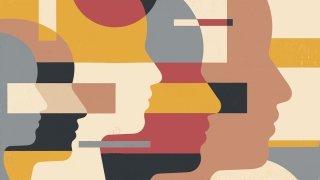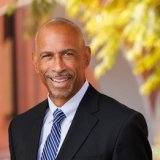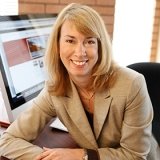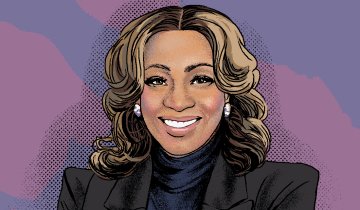In March 2020, shortly after USC announced it was closing its campuses in response to the pandemic, Emily T. Sandoval EdD ’18, associate vice provost of student affairs and student engagement, found herself with only a few days to come up with a plan that would leave no students unhoused.
Sixteen hundred students had asked for permission to remain in USC housing, including many who said they were homeless, were left stranded by COVID-19 travel restrictions or had other reasons they could not live at home. Developing a process to decide who could stay was just one of many urgent tasks Sandoval faced, including ensuring that her staff was safe and able to work virtually.
“There was nothing that could have prepared us for this,” she reflected recently.
Sandoval was not alone in discovering that 2020’s challenges tested education leaders like never before. Some found that to be effective leaders, they had to break away from traditional approaches, listen more to their gut and pay closer attention to relationship building and other soft skills, all while upholding their organization’s core values. Leading with equity in mind also became more urgent as the pandemic and the anti-racism movement heightened awareness of long-standing social, economic and educational disparities.
“Our education leaders are on the front lines of addressing many complex challenges that they typically did not learn how to address from their courses in grad school,” said Pedro A. Noguera, the Emery Stoops and Joyce King Stoops Dean of the USC Rossier School of Education. To help break through those challenges, Noguera asserted, today’s leaders “must be resourceful and creative, they must be capable of articulating a clear and compelling vision to lead and inspire their staff, and they must possess a high level of emotional and social intelligence to maintain positive relationships with the school board and community.”
Lessons from the field
Superintendent Cuauhtémoc Avila EdD ’11, who heads the 25,000-student Rialto Unified School District in San Bernardino County, California, said if he were to design a course on what education leaders needed to know to survive the past year and a half, he would focus on fundamental human virtues.
“There was no greater need for kindness than through this pandemic,” Avila said. As one example, Avila pointed to the free food-distribution program Rialto ran during its lockdown, which lasted from March 2020 until its reopening in August 2021. District personnel went so far as to make home deliveries to families who were unable to travel to the meal-distribution sites.
“These were situations we didn’t have any experience in,” Avila recalled. “It wasn’t in the manual that we were now in the business of home delivery of meals.

“You can’t manage a pandemic; you can’t control the conditions that have been placed in front of you. But I believe that with the agency of human decency, you can overcome these challenging circumstances.”
For Avila, that often meant personally addressing the needs of families. He recalled a parent who sought his help: “She called for direction, for clarification, when her kids did not want to log on to class and she just did not know what to do. When she came down with COVID and had to isolate from her kids and could not pick up their meals, I did what I needed to do to make sure her needs and the needs of her kids continued to be served.”
Avila has made kindness, honesty and other moral virtues the focus of efforts to change the culture of a district that had been beset by scandals before he became superintendent in 2015. Those efforts have included “restorative circles” and “courageous” sessions to help staff members “let go of our traumas that keep us from being happy with ourselves and kind towards others,” he said. He attributes improvements in graduation rates and staff morale at least partly to the shifting culture.
He also has flattened Rialto’s management hierarchy and removed traditional titles that perpetuate what he regards as an outmoded, corporate education model. Instead of deputy, associate or assistant superintendents, the top central-office administrators are called agents (as in agent of change) with titles such as lead strategic agent, lead academic agent and lead innovation agent.
“We are simply encouraging everyone to be on an equal playing field with respect to ideas and how we can improve as an organization,” Avila explained. As an example, he pointed to the district’s award-winning environmental literacy program, inspired and led by a former member of the groundskeeping staff.
Avila believes most education schools reinforce the corporate model of education, which he said is resistant to change and suppresses good ideas. “We have to blow up the system and create something new,” he said. “Understanding human needs will go further than simply knowing how to plan and hold people accountable.”
Halfway around the world in Uganda, COVID-19 upended education as much as it did in the United States. Jane Frances Nakato EdD ’20, who founded and runs five private elementary schools in Kampala, went through two shutdowns and saw her enrollment of 350 pupils plummet by half after switching to online learning. The resulting financial hit led to a reduction in salaries, which caused some teachers to quit.
Her toughest challenge was trying to renegotiate rent with her landlords. When all but one agreed to new terms, she made the painful decision to close one campus about six months into the pandemic.
Nakato says she wishes that she had been better at financial planning and that she had acted before the pandemic to open a fully online school, the focus of one of her projects in the Global Executive EdD program. But what helped her the most as a leader was discussing spiritual books with her book club and practicing mindfulness.
“I have learned to be calm for the sake of the people I lead,” she wrote in an email. “I deliberately refuse to be dragged into negative space. This has helped me encourage my workmates to keep positive, and in the process, I have kept my lead team,” including her head teachers, education directors and other administrators. Enrollment has also improved, and the online attendance rate is nearly 100 percent.
For Ryan Cornner EdD ’10, vice chancellor for educational programs and institutional effectiveness in the Los Angeles Community College District, the key was fostering strong relationships within the 230,000-student district and with the diverse communities it serves.
“One of my deep beliefs is that leadership is about relationships,” Cornner said recently. “Part of that is people understanding that your commitment is to be where they’re at and make sure we’re working together.”
He demonstrated that commitment on the most challenging days of the pandemic, which came soon after the nation’s largest community college system went remote. Only 17 percent of its classes were online before the shutdown, so quick action was needed. The district postponed spring break and scheduled three days of intensive training for 5,500 faculty members.
Instructors could access in-person training and other resources they would need to teach remotely at any of the district’s nine campuses. “You saw everyone there working as hard as they could for the benefit of students,” Cornner recalled. “There was nobody phoning it in.”
“One of my deep beliefs is that leadership is about relationships.” —Ryan Cornner EdD ’10, vice chancellor at Los Angeles Community College District
Within 10 days the district converted 10,000 courses from brick-and-mortar to online delivery.
Cornner’s keystone, building relationships, extends to the community beyond the college campuses. Through partnerships and private donors, the district distributed 30,000 free laptops and 6,200 $50 Kroger gift cards to students in need.
“In addition to how to be a leader in academia, future training needs to teach how to be a leader in the community and an understanding that the two are inseparable,” Cornner said. “The only way we will truly achieve our equity goals, our student success goals, is by collaborating with other entities in the community to make sure students’ needs are addressed.”
If there was one lesson he could impart to future education leaders, he said, it would be to set a vision that is “broader than the institution itself and focus on the impact the institution has when people leave its doors. That is going to be more and more important in leadership training.”
The future of leadership training at USC Rossier
USC Rossier Associate Professor of Education Tatiana Melguizo agrees that education leaders, particularly in community colleges, need a more expansive view of their responsibilities.
“The reality is these community colleges have become places where you have to make sure there are no issues with food insecurity, access for child care, access to mental health,” she noted. “That is tricky, but the job description has changed and leaders have to adapt.”
To help leaders address challenges and improve learning, this fall USC Rossier will launch Breakthrough Leaders, a continuing education program for alumni and other professionals working in prekindergarten through higher education. It will feature weeklong summer institutes, online courses, weekend immersion programs and short-term consultancies on topics including strategic planning, databases decision-making, labor-management partnerships, and diversity, equity and inclusion.
Developing equity-minded leaders has been central to a USC Rossier education since the school revised its mission statement in 2017. For faculty that has meant wrestling with ways to evolve their teaching to make classes more inclusive.

Like many of his colleagues, Professor Mark Power Robison, chair of the Global Executive Doctor of Education program, has participated in workshops to hone his equity acumen, including enhancing his ability to facilitate difficult conversations. He retooled the course he teaches in the program, Framing Educational Leadership, replacing about half of the content with material that reflects the school’s core mission. So, when his students returned to campus last summer, they discussed topics such as Indigenous education and the impact of globalization on educational equity in a variety of societies.
“For all of us who are teaching … the last year and a half has challenged us to find ways to help people talk about really difficult issues,” said Robison. “It’s challenged all of us to do everything we can to facilitate those discussions and help our students who are education leaders be as prepared as possible to lead those discussions in their organizations.”
That focus attracted students such as Kate Rogers, who enrolled in the Global EdD program last December. Recently named executive director of the San Antonio-based preservation nonprofit Alamo Trust, she has been grappling with a controversy over how to portray the role of slavery in the 1836 Battle of the Alamo.
Professor of Clinical Education Julie Slayton, who chairs the Doctor of Education in Educational Leadership program concentration on leading instructional change, makes sure her students are able to reflect on the ways their own identities shape how they teach and lead.
She begins her class and dissertation groups with an exercise called “I Am From,” which asks participants to write down answers to questions about personal characteristics, such as race, ethnicity, gender, occupation and religion. To model the critical reflection she believes is vital for leaders, Slayton discusses her own responses—“I’m a White woman, I’m Jewish, I’m upper-middle class … ”—and how those factors shape her worldview. Then, several students share how they answered the questions.
The process often elicits deeply emotional responses. “This exercise took the veil off who we are,” said Ava Gilani Jacobs EdD ’21, a fifth-grade teacher in the Las Virgenes Unified School District who is aiming to become a teacher educator.
“It creates a moment of real vulnerability, which is an incredibly important thing for leaders to have,” Slayton observed. “If we want to see teachers and schools take up anti-racist or culturally relevant approaches to working in classrooms, we need leaders with a skill set for creating conditions where people can grapple in very scary ways with how their identity matters and shapes the way they act.”
Bold thinking about what today’s leaders need is coming from USC Rossier researchers like Adrianna Kezar, Dean’s Professor of Leadership and director of the Pullias Center for Higher Education, whose recent work explores such concepts as love, personal journeys and liberation.
She has collaborated with USC Rossier PhD student Jordan Harper on “Leadership for Liberation,” a guide to developing leaders with the imagination and commitment to upend systems of oppression. Noting that 85 percent of leadership educators are White, the guide offers exercises that seek to expand awareness of the structures and cultural norms that uphold whiteness and White supremacy.
Harper has given presentations on the framework to student leaders at the University of Massachusetts at Boston and San Jose State University but would like to introduce it to other types of leaders. “I’m interested in calling out White supremacy,” said Harper, who was compelled to create the liberation model in part because of his work on leadership-development curricula for college students.
“We’re very good talking about equity, but we still get cold feet talking about whiteness.” Kezar was also the lead researcher on a study for the American Council on Education on shared equity leadership, a model for scaling up equity work by making it a collective effort instead of the responsibility of a lone office or unit. The study was based on interviews with 63 campus leaders conducted amid last year’s upheavals over the pandemic and racism.
“You can’t manage a pandemic; you can’t control the conditions that have been placed in front of you. But I believe that with the agency of human decency, you can overcome these challenging circumstances.” —Cuauhtémoc Avila EdD ’11, superintendent of Rialto Unified School District
The leaders, who included college presidents, provosts, faculty, staff and chief diversity officers, approached equity as a team effort so that advancing equity “becomes widespread and institutional rather than limited and localized to one individual,” the report says. Central to the team’s effectiveness was that its members had undergone a personal journey, such as an experience or close observation of discrimination, that cemented their commitment to equity.
The leaders also shared certain practices—foremostly, putting students’ needs at the center of decision-making—as well as core values such as courage, transparency, being comfortable with being uncomfortable, and love for those they work with and for.
“Love is not something we talk about in our classroom spaces very often,” Kezar noted recently. “We tend to talk about the analytic skills that are required and not so much about some of these other really important skill sets that fall outside of what’s comfortable in academic settings, and yet they are so important for leading around equity. I would like to see us push on these harder, more delicate spaces.”
For USC’s Sandoval, the responsibility of leaders to show care was a major lesson of last year.
“We were all stressed out and a little overwhelmed,” she said, recalling those long days when she and her team were making crucial housing decisions for thousands of students. She got through the crisis by staying calm and being an agile decision-maker but also by “realizing that I wasn’t just a supervisor managing people who oversee departments but having conversations like, ‘What’s going on with you? How is home life going? How are you balancing being a teacher to your children at home while trying to lead a department?’
“I just had to think bigger because we all had a lot more going on in our lives.”









